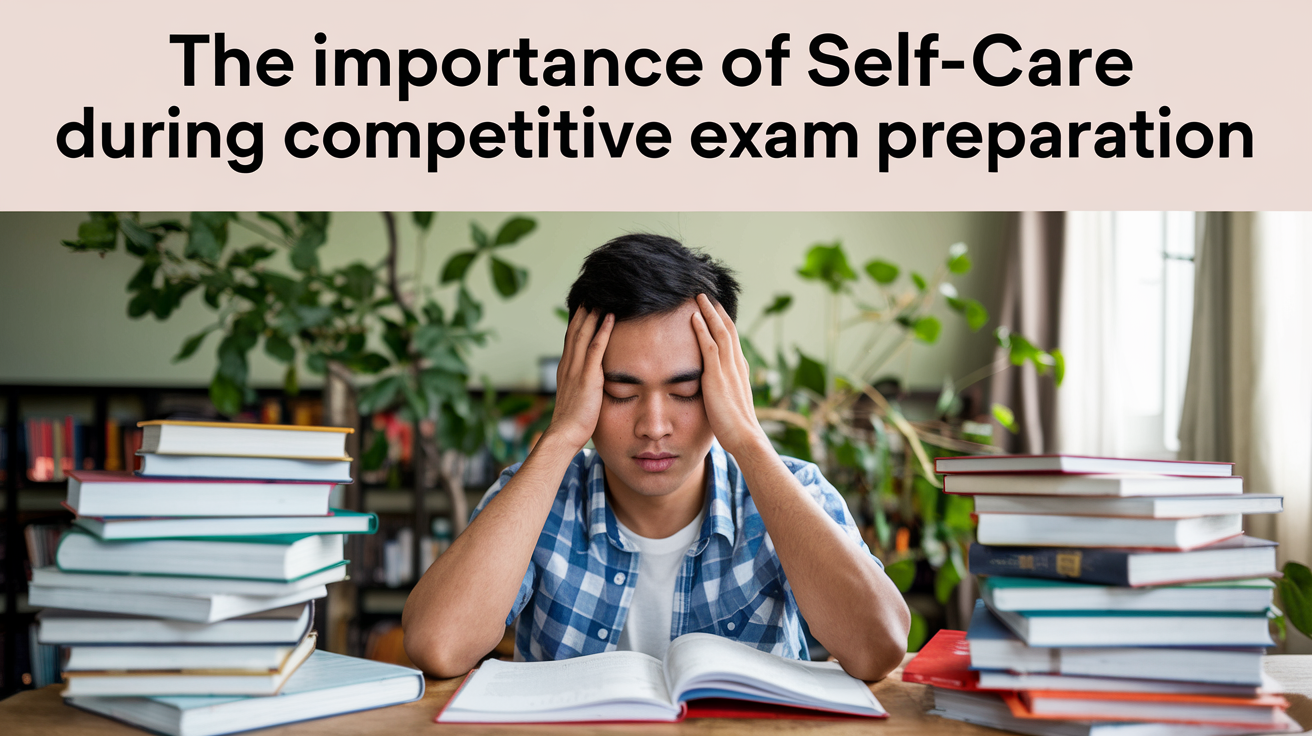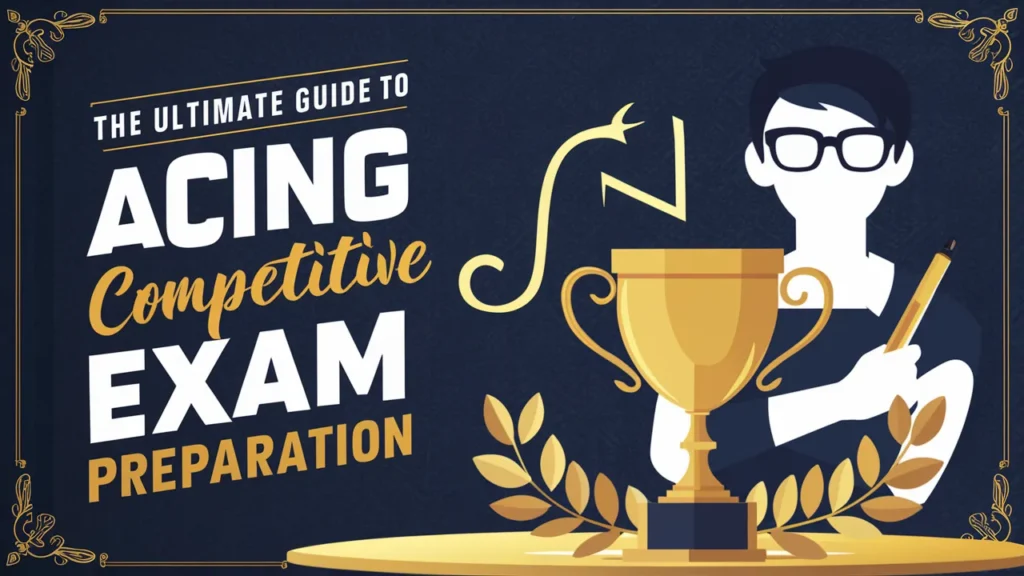
Preparing for competitive exams can be one of the most intense and stressful periods in a student’s life. With a vast syllabus to cover, tight schedules, and the pressure to perform well, students often forget to prioritize one key aspect of their preparation—self-care. While studying hard is essential, neglecting your physical, mental, and emotional well-being can severely impact your performance and overall health. In this blog, we will explore the importance of self-care during competitive exam preparation and how it can positively influence your performance.
What is Self-Care?
Self-care refers to the practice of taking action to maintain and improve your physical, mental, and emotional well-being. For students, self-care can range from ensuring adequate sleep, eating healthy, and exercising, to taking breaks, managing stress, and maintaining a balanced lifestyle.
Often, students overlook self-care as they push themselves to study for long hours, thinking that more study time automatically translates into better results. However, overworking without proper care can lead to burnout, stress, and decreased productivity. Practicing self-care helps maintain energy levels, improves focus, and enhances the retention of information, which is crucial for competitive exam success.
Why Self-Care is Crucial During Competitive Exam Preparation
1. Prevents Burnout
The intense demands of competitive exam preparation can easily lead to burnout—a state of physical and emotional exhaustion. Burnout can cause students to feel drained, overwhelmed, and even demotivated, which directly hampers their ability to study effectively. By practicing self-care, you can avoid burnout and ensure that you stay mentally and physically fit throughout your preparation.
How to Prevent Burnout:
- Set realistic goals: Avoid overloading yourself with unrealistic study targets. Break down your preparation into manageable tasks.
- Take regular breaks: After studying for 45-60 minutes, take short breaks to rest and recharge. This will prevent mental fatigue and improve focus.
- Get enough rest: Prioritize sleep. Without adequate rest, your brain’s capacity to retain information diminishes.
2. Enhances Concentration and Memory
Your brain is like a muscle that needs rest and proper care to function optimally. Neglecting your health by not sleeping well, eating unhealthy foods, or skipping breaks can affect your cognitive abilities, making it harder to concentrate and retain information. Self-care practices such as adequate sleep, proper nutrition, and mindfulness exercises help sharpen your focus and improve memory, leading to more productive study sessions.
Tips for Better Concentration and Memory:
- Get enough sleep: Aim for 7-8 hours of sleep each night. Sleep consolidates memories and aids in information retention.
- Eat brain-boosting foods: Include foods like nuts, leafy greens, berries, and fish in your diet, which are known to improve brain function.
- Practice mindfulness: Engage in mindfulness activities like meditation or deep breathing exercises to calm your mind and enhance focus.
3. Reduces Stress and Anxiety
Exam stress and anxiety are common experiences for students preparing for competitive exams. While a little stress can motivate you to study, chronic stress and anxiety can have a negative impact on your mental and physical health, ultimately affecting your performance on the exam day. Incorporating self-care into your routine helps manage stress levels, keeping you calm and focused throughout your preparation.
Ways to Reduce Stress and Anxiety:
- Physical exercise: Regular physical activity releases endorphins, which are natural stress relievers. Even a 20-minute walk or a short yoga session can significantly reduce stress.
- Mindfulness meditation: Practicing mindfulness meditation daily can reduce anxiety and promote a sense of calmness.
- Stay organized: Keeping a well-organized study schedule can reduce the last-minute panic and help you feel in control of your preparation.
4. Improves Overall Well-being
Your well-being directly impacts your ability to study effectively. Poor health can disrupt your study schedule and reduce the quality of your preparation. By practicing self-care, you can maintain a healthy balance between your study time and personal well-being, which in turn boosts your productivity.
Tips for Better Well-being:
- Hydrate regularly: Drinking enough water throughout the day keeps you energized and alert.
- Take short naps: If you feel too tired, take a 15-20 minute nap to refresh your mind.
- Stay connected: While studying for competitive exams, don’t completely isolate yourself. Stay in touch with family and friends to maintain a healthy support system.
Essential Self-Care Practices During Exam Preparation
1. Sleep Hygiene
Adequate sleep is a non-negotiable part of self-care. During sleep, your brain processes and consolidates the information you’ve studied, which is crucial for retention and recall. A well-rested brain is more efficient at solving complex problems and thinking critically—skills that are essential for competitive exams.
Sleep Tips:
- Set a consistent sleep schedule, going to bed and waking up at the same time every day.
- Avoid using screens (phones, laptops, etc.) for at least 30 minutes before bedtime.
- Create a relaxing pre-sleep routine such as reading a book, listening to calming music, or meditating.
2. Healthy Eating Habits
Your brain requires proper nutrition to function at its best. Eating balanced meals filled with brain-boosting nutrients can enhance cognitive function, improve memory, and increase energy levels.
Nutritional Tips:
- Include omega-3 rich foods like fish, flaxseeds, and walnuts, which are known to improve brain function.
- Avoid excessive caffeine and sugar, which can lead to energy crashes and irritability.
- Opt for complex carbohydrates like whole grains, which provide long-lasting energy for study sessions.
3. Physical Activity
Engaging in physical activity is not only good for your body but also for your brain. Exercise helps reduce stress, improve mood, and increase mental sharpness—all of which are essential during exam preparation.
Exercise Tips:
- Incorporate at least 30 minutes of physical activity into your daily routine. This could be anything from brisk walking to yoga or even a short home workout.
- Use your breaks between study sessions for stretching or quick physical exercises to keep your body and mind active.
4. Mental Health and Emotional Well-Being
Mental health is just as important as physical health during exam preparation. Managing your emotions, maintaining a positive outlook, and seeking support when needed are key aspects of self-care.
Mental Health Tips:
- Practice gratitude by listing things you’re thankful for every day to boost positivity.
- Journaling can help you process emotions and relieve stress.
- If you feel overwhelmed, don’t hesitate to seek help from a mentor, counselor, or support group.
5. Social Connections
Human beings are social creatures, and maintaining healthy relationships can greatly reduce feelings of isolation and stress. Don’t cut yourself off from family or friends while preparing for competitive exams. Sharing your concerns or just having a casual conversation can provide emotional support and much-needed breaks from studying.
Conclusion
Self-care is not just a luxury—it is a necessity during competitive exam preparation. By incorporating self-care practices into your daily routine, you’ll not only enhance your performance but also safeguard your physical, mental, and emotional well-being. Prioritizing sleep, healthy eating, physical activity, and mental health will give you the stamina and confidence to tackle your exams with clarity and focus. Remember, taking care of yourself is not wasting time; it is investing in your future success.


